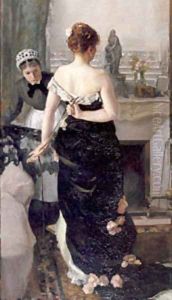Roll Alfred Paintings
Alfred Philippe Roll was a distinguished French painter, born on March 1, 1846, in Paris. He emerged as a pivotal figure in the French art scene of the late 19th and early 20th centuries, known for his contributions to both the academic and realist traditions. Roll's education in art began at the prestigious École des Beaux-Arts in Paris, where he studied under luminaries such as Jean-Léon Gérôme. His talent was evident early in his career, and he quickly garnered attention and acclaim for his work.
Roll's oeuvre is characterized by its diversity, encompassing portraits, landscapes, and scenes of everyday life, as well as powerful depictions of social and industrial subjects. He was particularly adept at capturing the dynamics of the working class and the industrialization of France, making significant contributions to social realism. His painting 'Jeanne d'Arc' (1880) is among his most celebrated works, showcasing his skill in historical portrayal.
Throughout his career, Roll was honored with numerous awards, including the prestigious Legion of Honour. He was also a member of the Académie des Beaux-Arts, reflecting his prominent status within the French art world. Beyond his artistic endeavors, Roll played an influential role in advocating for artists' rights and was instrumental in organizing the Salon des artistes français, which became a critical platform for artists to showcase their work.
Alfred Roll's legacy endures not only through his contributions to French art but also in his commitment to social issues and the mentorship of younger artists. His works are preserved in several major museums, including the Musée d'Orsay in Paris. Roll passed away on October 27, 1919, leaving behind a rich body of work that continues to be celebrated for its depth, technique, and emotive power. His life and art remain a testament to the vibrant cultural and social tapestry of France during his time.
